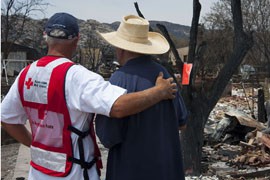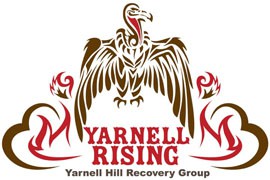Cronkite News has moved to a new home at cronkitenews.azpbs.org. Use this site to search archives from 2011 to May 2015. You can search the new site for current stories.
FEMA denial no surprise to Yarnell residents, who vow to press on after fire
WASHINGTON – Residents of Yarnell said Monday that they were never really depending on help from the federal government, and vowed to continue rebuilding their community after a request for disaster aid was rejected Friday.
Frances Lecher, a spokeswoman for the Yarnell Hill Recovery Group, said residents are instead focused on the here and now of healing the town that was the scene of a deadly wildfire that killed 19 firefighters and destroyed 134 homes.
“To be honest, when people came in to town, they didn’t come here thinking, ‘I can’t wait to see what FEMA (the Federal Emergency Management Agency) does for us,’” Lecher said. “Until you’re in a disaster, you don’t know how all the pieces fall into place.”
Gov. Jan Brewer in early July asked for a federal disaster declaration after the June blaze, and said she was reassured by President Barack Obama during a visit to Phoenix last week that he would look in to the request.
But FEMA late Friday rejected the request without explanation.
A FEMA spokesman said Monday that the agency had provided assistance with firefighting efforts during the blaze and he noted that aid was still available from a number of other federal agencies. But ultimately, the damage to Yarnell did not rise to the level of a federal disaster, said Dan Watson.
“In this case, based upon the findings of the joint federal, state and local preliminary damage assessment teams, it was determined that the damage to uninsured private residences from this event was not beyond the response and recovery capabilities of the state/local governments, and voluntary agencies,” Watson said in an emailed statement.
Lecher and others with the Yarnell Hill Recovery Group praised the initial response and assistance from local and volunteer groups in the days after the blaze. Lecher said it also came down to the strong relationships of those in the community.
“A lot of people were able to move in with friends and family,” she said. “So it’s thanks to the community.”
Brian Gomez, a spokesman for the American Red Cross Grand Canyon Chapter, saw the strong bonds holding Yarnell together.
“It’s a tight-knit community,” he said. “A lot of people that came to our shelters already knew each other.”
The Red Cross opened up two shelters in the area as soon as the fire began and continued to work there for the next 10 days, he said. It helped find housing for residents who had lost homes, assisted with bills, rent and essentials such as food.
Another Yarnell Hill Recovery Group spokeswoman said the Red Cross and the Salvation Army truly helped and “filled that immediate response.”
“We’re trying to pick up where they left off,” said Kathy Montgomery.
But state officials have not given up on FEMA aid.
“I am deeply troubled by the Obama administration’s decision to deny much-needed recovery assistance in the wake of Arizona’s deadliest wildfire,” Brewer said in a statement Friday, after the FEMA denial was announced.
That was echoed by Arizona Republican Sens. John McCain and Jeff Flake, who issued a joint statement Friday expressing their disappointment. They said they would talk with Brewer “and begin exploring with her options for appealing this decision.”
Brewer’s office did not respond to requests for comment Monday. But Rep. Paul Gosar, R-Prescott, said in a statement that he was also disappointed by the denial.
“The people of Yarnell do not ask much from the federal government,” he said, adding that the deaths and destruction from the fire make it “reasonable to expect FEMA to step in.”
Denny Foulk, the emergency management coordinator for Yavapai County, said local residents were wise not to bank on federal funds. But he said there are “bigger picture” problems that a disaster declaration would have helped, like repairs to the water system.
“Yarnell Recovery Group is helping the direct people affected, no bones about it. They’re doing an outstanding job, I’m very proud of those people,” Foulk said. “But at the same time I’m looking at a bigger picture.”
Lecher believes the FEMA rejection is more like a “political slap in the face,” but says Yarnell will be OK without the federal aid.
Gomez, who said the Red Cross ended its work in the community a couple of weeks ago, shares Lecher’s confidence in the community’s resilient nature.
“If there’s any community out there that can come out of this, it’s Yarnell,” he said.








